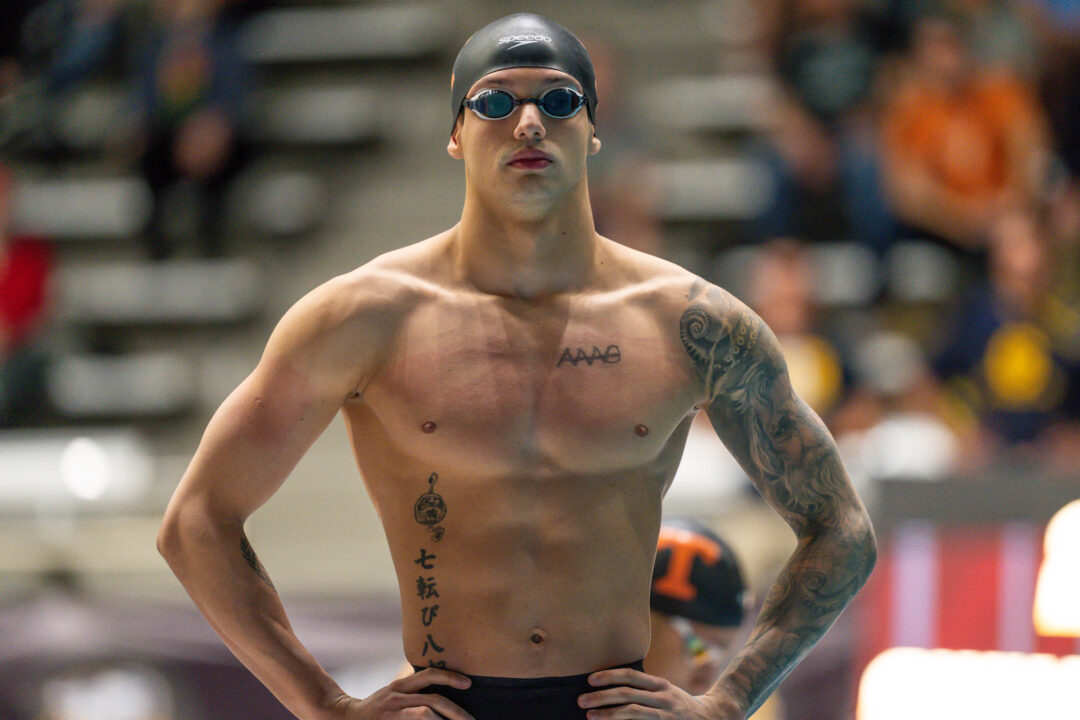During the third finals session of the 2025 Brazilian Swimming Championships, Gui Caribe demonstrated that his short course improvements this season have translated to long course success.
After securing silver medals in both the 50 and 100 freestyle at the 2024 Short Course World Championships in Budapest, Caribe set new personal bests in short course yards at the 2025 NCAA Championships last month.
His progress was evident, but a standout performance in long course was still missing. Not anymore. On Wednesday, he won the 100 freestyle in Rio de Janeiro with a time of 47.10 seconds, splitting 22.23/24.87.
This is the fastest time in the world this season, surpassing Kyle Chalmers‘ 47.27 from earlier this month.
It’s the third time Caribe has broken the 48-second barrier. His previous personal best was 47.82 from 2022, meaning he hadn’t improved his long course time in nearly two and a half years.
| Year | 50 Split | Second 50 Split | 100 Time |
| 2022 | 23.12 | 24.70 | 47.82 |
| 2024 | 22.66 | 25.29 | 47.95 |
| 2025 | 22.23 | 24.87 | 47.10 |
“I’m very happy,” Caribe said post-race. “I’ve been chasing this for almost two and a half years. It’s gratifying to return to this pool, where I first swam a 47, and once again set a personal best.
“Now I’m going after the 46, and I have a few years ahead of me to bring that world record back to Brazil.”
Caribe is now the 10th fastest performer of all time in this event, tied with James Magnussen‘s time from the 2012 Australian Olympic Trials.
View this post on Instagram
With Cesar Cielo ranking 3rd all-time with his 46.91 then-world record set at the 2009 World Aquatics Championships, this marks the first time since 1998 that two Brazilian swimmers are in the all-time top 10 for the men’s 100m freestyle.
In 1998, Fernando Scherer clocked 48.69 at the Goodwill Games in East Meadow, ranking as the 3rd fastest performer at the time, behind only Alexander Popov (48.21) and Matt Biondi (48.42). Scherer’s time also placed him atop the world rankings that year, ending Popov’s seven-year reign.
At that time, Gustavo Borges was the 5th fastest performer in history with his 49.02 from the 1996 Olympics.
Cielo, Scherer, and Borges have become legends in Brazilian swimming, all earning Olympic medals and numerous international accolades. Is Caribe on the path to joining them?
Other results from the third finals session of the Brazilian Nationals, serving as trials for the 2025 World Aquatics Championships in Singapore:
- Michigan’s Stephanie Balduccini claimed victory in the women’s 100 freestyle with a Singapore-worthy time of 53.87. This is a new South American record, shaving 0.16 seconds off Larissa Oliveira’s previous mark from 2016. Balduccini had already won the 200 freestyle the day earlier, also under the World Aquatics cut for Singapore.
- 39-year-old Joao Gomes Junior took the win in the men’s 50 breaststroke with a time of 27.23, dipping under the World Aquatics standard of 27.33 for Singapore. Gomes Junior is a seasoned veteran, having won silver at the 2017 World Championships and bronze in 2019 in this event.
- Gabrielle Assis won the women’s 50 breaststroke in 31.98, narrowly beating Manuella Ballan Sega by just 0.01 seconds. Assis had already captured the title in the 100 breaststroke two days earlier.
- Gabrielle Roncatto topped the field in the women’s 400 IM with a time of 4:50.80. She had already met the Singapore qualifying standard earlier in the meet with her performance in the 400 freestyle on Day 1.
- The men’s 400 IM featured a compelling duel between Brandonn Almeida and Stephan Steverink. In 2024, both had swum faster than the World Aquatics qualifying mark of 4:17.48, but neither was able to replicate those times here. Almeida won in 4:18.08, while Steverink took silver with 4:19.17.

Is it 1988 (title) or 1998 (body text)?
1998. Fixing now.
Any update on Magnussens dope progress?
I’ve heard some off the record updates. They have a big press conference upcoming in May where I think they’re going to talk more – they don’t want to reveal too much before then.